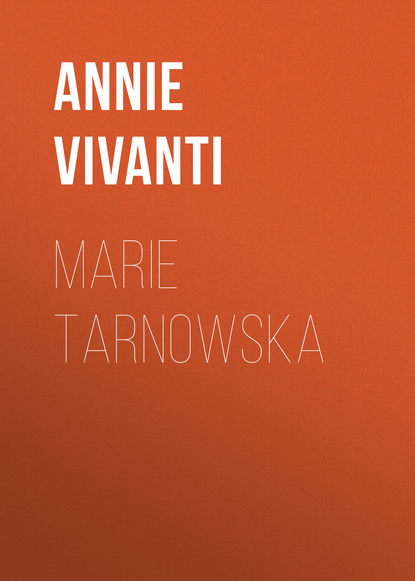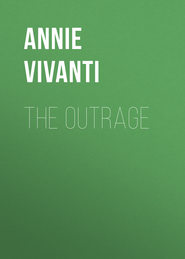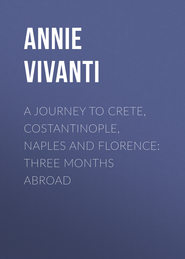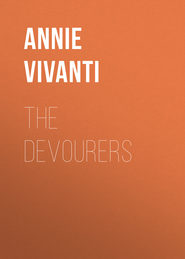По всем вопросам обращайтесь на: info@litportal.ru
(©) 2003-2024.
✖
Marie Tarnowska
Настройки чтения
Размер шрифта
Высота строк
Поля
I kissed him and turned out the light; then I went downstairs to get a book from the library, intending to return to my room at once. I felt nervous and restless. I was afraid I should not be able to sleep.
How did it happen? Perhaps it was an instant's forgetfulness that caused me to draw the door of the library after me. It closed with a heavy thud. The long, dark-red curtain turned on its rod and fell in front of the doorway.
I was imprisoned!
XXII
I should never dare to leave that room.
Suddenly I thought that Tioka might call me. But between him and me, standing outside on the threshold of that draped door, was there not the man whom I had seen die in Yalta? Horrifying memory! For a long time I did not venture to stir. I turned my head and looked behind me, then fixed my eyes afresh on the red curtain. Suddenly I thought I heard a cry.
Yes; it was Tioka calling me, Tioka all alone upstairs, who was frightened too, frightened even as I was. With shivers swathing me from head to foot as with an icy sheet, I listened to those cries which every moment grew shriller and wilder. Then, in answer to him, I screamed too.
Oh, those shrieks ringing through the empty house—shrieks which only that silent ghost behind the door could hear!
Suddenly another thrill ran through me; the electric bell had sounded. Some one was ringing at our door; some one was coming to save us. Tioka still screamed, and the bell continued to ring. I could also hear blows on the door and then a voice—Prilukoff's voice—calling: “It is I. Open the door!”
With a sob of mingled terror and joy I thrust back the curtain and flung open the dreaded door. Stumbling blindly through the passage I reached the hall door and drew back the latch. Prilukoff stood on the threshold; he was pale as death.
“What has happened?” he cried. “What is the matter?” And he gripped my arm.
I was sobbing with joy and relief. “Tioka, Tioka!” I called out. “Don't cry any more. Donat has come! We are here, we are near you!”
Tioka's cries ceased at once.
But Prilukoff still held me fast. “What has happened!” he asked, clenching his teeth.
“I was afraid, I was afraid—” I gasped.
“Of whom?”
A fresh outburst of tears shook me. “Of the dead,” I sobbed.
“Leave the dead to me,” said Prilukoff.
He entered and shut the door.
········
Thus, unconscious and unwilling, I descended yet another step down the ladder of infamy.
Shrinking and reluctant I trailed my white garments into defilement, sinking with every step deeper into the mire which was soon to engulf me; the mire which was to reach my proud heart, my pearl-encircled throat, my exalted brow on which nobility had set its seal in vain.
It was about that time, I remember, that Delphinus, a renowned fortune-teller, came to Moscow. One morning, having nothing else to do, I went with the smiling, skeptical Elise to consult him in his luxurious apartments.
He took both my hands and gazed for a long time at a crystal ball which was before him. Then he said: “Woman, your life is a tragedy.”
I smiled, incredulous yet disturbed. “Pray say rather a comedy, if you can.”
He shook his head. “A tragedy,” he repeated gloomily. Then he uttered several commonplaces which might apply to any other woman as well as to me. Finally, with knitted brows, he looked still more closely into the crystal. “Two men,” he said, speaking slowly, “have yet to enter into your life. One will bring salvation, the other ruin. Choose the one, and you will attain happiness; choose the other and you will perish.”
He paused. “You will choose the other,” he said, and released my hand.
I got up, smiling. “Oh, no, indeed! Now that I have been forewarned—”
“You will choose the other,” he repeated oracularly. “It is your destiny.”
Although I am not really superstitious, this curt, obscure prediction impressed me strangely.
“I shall beware of whom I meet,” I said to myself; and indeed, every time a man spoke to me, even casually, I wondered: could this be the One?—or the Other?
But days and months passed, and I made no new acquaintances.
Prilukoff kept me jealously secluded, and little Tioka absorbed my every hour. Apart from these two I saw no one at all.
It was by mere chance that one day I met a former acquaintance.
I had taken Tioka for a walk in the park when we saw a gentleman and a child sitting on a bench in the shade. They were both dressed in deep mourning, and they looked sad and disconsolate. The little boy was leaning his fair head on his father's arm, watching him as, with an air of melancholy abstraction, he traced hieroglyphics in the gravel with his stick. On hearing us approach the man in mourning raised his head and looked at us.
I recognized him at once. It was Count Paul Kamarowsky, the husband of one of my dearest friends, who lived at Dresden, and whom I had not seen for nearly two years.
He recognized me, too, and started to his feet with eager face, while the little boy looked at us diffidently, still holding to his father's sleeve.
“Countess Tarnowska!” he exclaimed, holding out both his hands.
I laid my hand in his; as he clasped it between his black-gloved fingers a slight shiver ran through me. I turned to the pale little child beside him who was still glancing up at me timidly. “Is this Grania?”
“Yes. It is Grania,” said Count Kamarowsky. Then he perceived my questioning glance at his mourning. “Poor Emilia—” he began, but his voice broke.
“Poor Emilia?” Was it possible that my little school friend of long ago, the fair-haired, laughter-loving Lily should now be “poor Emilia,” to be spoken of in solemn, mournful tones? I could hardly believe it. I seemed to see her still, bending over her 'cello with her fair curls tumbling over her face as she played her favorite Popper tarantelle.... I could see her laughing with mischievous eyes agleam behind her flaxen locks, like dark stars seen through a golden cloud. And here, clad in mourning for her, her husband and child stood before me.
Great tenderness and pity filled my heart.
Tioka had gone close to Grania, and the two children were looking at each other with that expression of simple gravity which is so far removed from the conventional smile with which grown-up people greet each other for the first time. Their gaze was serious, thoughtful and interrogative.
“Do you like pelicans?” Tioka inquired suddenly.
“No,” said Grania.
“Neither do I,” said Tioka; and there was a long silence.
“Do you like ducks?” asked Tioka.
“Yes,” replied Grania.
“So do I,” said Tioka; and their friendship was sealed.
Count Kamarowsky and I were less prompt in discovering a community of tastes such as that which so quickly linked our two children together. This grave silent man in his widower's garb was almost a stranger to me. As we parted he asked permission to call. But on the following day a telegram from my father summoned me to Otrada. My mother was ill and desired my presence.
How did it happen? Perhaps it was an instant's forgetfulness that caused me to draw the door of the library after me. It closed with a heavy thud. The long, dark-red curtain turned on its rod and fell in front of the doorway.
I was imprisoned!
XXII
I should never dare to leave that room.
Suddenly I thought that Tioka might call me. But between him and me, standing outside on the threshold of that draped door, was there not the man whom I had seen die in Yalta? Horrifying memory! For a long time I did not venture to stir. I turned my head and looked behind me, then fixed my eyes afresh on the red curtain. Suddenly I thought I heard a cry.
Yes; it was Tioka calling me, Tioka all alone upstairs, who was frightened too, frightened even as I was. With shivers swathing me from head to foot as with an icy sheet, I listened to those cries which every moment grew shriller and wilder. Then, in answer to him, I screamed too.
Oh, those shrieks ringing through the empty house—shrieks which only that silent ghost behind the door could hear!
Suddenly another thrill ran through me; the electric bell had sounded. Some one was ringing at our door; some one was coming to save us. Tioka still screamed, and the bell continued to ring. I could also hear blows on the door and then a voice—Prilukoff's voice—calling: “It is I. Open the door!”
With a sob of mingled terror and joy I thrust back the curtain and flung open the dreaded door. Stumbling blindly through the passage I reached the hall door and drew back the latch. Prilukoff stood on the threshold; he was pale as death.
“What has happened?” he cried. “What is the matter?” And he gripped my arm.
I was sobbing with joy and relief. “Tioka, Tioka!” I called out. “Don't cry any more. Donat has come! We are here, we are near you!”
Tioka's cries ceased at once.
But Prilukoff still held me fast. “What has happened!” he asked, clenching his teeth.
“I was afraid, I was afraid—” I gasped.
“Of whom?”
A fresh outburst of tears shook me. “Of the dead,” I sobbed.
“Leave the dead to me,” said Prilukoff.
He entered and shut the door.
········
Thus, unconscious and unwilling, I descended yet another step down the ladder of infamy.
Shrinking and reluctant I trailed my white garments into defilement, sinking with every step deeper into the mire which was soon to engulf me; the mire which was to reach my proud heart, my pearl-encircled throat, my exalted brow on which nobility had set its seal in vain.
It was about that time, I remember, that Delphinus, a renowned fortune-teller, came to Moscow. One morning, having nothing else to do, I went with the smiling, skeptical Elise to consult him in his luxurious apartments.
He took both my hands and gazed for a long time at a crystal ball which was before him. Then he said: “Woman, your life is a tragedy.”
I smiled, incredulous yet disturbed. “Pray say rather a comedy, if you can.”
He shook his head. “A tragedy,” he repeated gloomily. Then he uttered several commonplaces which might apply to any other woman as well as to me. Finally, with knitted brows, he looked still more closely into the crystal. “Two men,” he said, speaking slowly, “have yet to enter into your life. One will bring salvation, the other ruin. Choose the one, and you will attain happiness; choose the other and you will perish.”
He paused. “You will choose the other,” he said, and released my hand.
I got up, smiling. “Oh, no, indeed! Now that I have been forewarned—”
“You will choose the other,” he repeated oracularly. “It is your destiny.”
Although I am not really superstitious, this curt, obscure prediction impressed me strangely.
“I shall beware of whom I meet,” I said to myself; and indeed, every time a man spoke to me, even casually, I wondered: could this be the One?—or the Other?
But days and months passed, and I made no new acquaintances.
Prilukoff kept me jealously secluded, and little Tioka absorbed my every hour. Apart from these two I saw no one at all.
It was by mere chance that one day I met a former acquaintance.
I had taken Tioka for a walk in the park when we saw a gentleman and a child sitting on a bench in the shade. They were both dressed in deep mourning, and they looked sad and disconsolate. The little boy was leaning his fair head on his father's arm, watching him as, with an air of melancholy abstraction, he traced hieroglyphics in the gravel with his stick. On hearing us approach the man in mourning raised his head and looked at us.
I recognized him at once. It was Count Paul Kamarowsky, the husband of one of my dearest friends, who lived at Dresden, and whom I had not seen for nearly two years.
He recognized me, too, and started to his feet with eager face, while the little boy looked at us diffidently, still holding to his father's sleeve.
“Countess Tarnowska!” he exclaimed, holding out both his hands.
I laid my hand in his; as he clasped it between his black-gloved fingers a slight shiver ran through me. I turned to the pale little child beside him who was still glancing up at me timidly. “Is this Grania?”
“Yes. It is Grania,” said Count Kamarowsky. Then he perceived my questioning glance at his mourning. “Poor Emilia—” he began, but his voice broke.
“Poor Emilia?” Was it possible that my little school friend of long ago, the fair-haired, laughter-loving Lily should now be “poor Emilia,” to be spoken of in solemn, mournful tones? I could hardly believe it. I seemed to see her still, bending over her 'cello with her fair curls tumbling over her face as she played her favorite Popper tarantelle.... I could see her laughing with mischievous eyes agleam behind her flaxen locks, like dark stars seen through a golden cloud. And here, clad in mourning for her, her husband and child stood before me.
Great tenderness and pity filled my heart.
Tioka had gone close to Grania, and the two children were looking at each other with that expression of simple gravity which is so far removed from the conventional smile with which grown-up people greet each other for the first time. Their gaze was serious, thoughtful and interrogative.
“Do you like pelicans?” Tioka inquired suddenly.
“No,” said Grania.
“Neither do I,” said Tioka; and there was a long silence.
“Do you like ducks?” asked Tioka.
“Yes,” replied Grania.
“So do I,” said Tioka; and their friendship was sealed.
Count Kamarowsky and I were less prompt in discovering a community of tastes such as that which so quickly linked our two children together. This grave silent man in his widower's garb was almost a stranger to me. As we parted he asked permission to call. But on the following day a telegram from my father summoned me to Otrada. My mother was ill and desired my presence.








